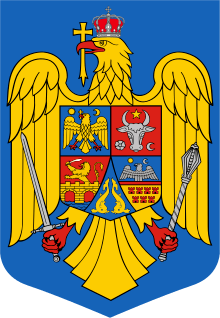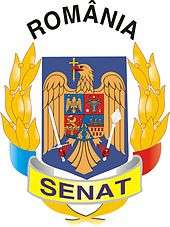Nicolae Văcăroiu
| Nicolae Văcăroiu | |
|---|---|
 | |
| President of Romania Acting | |
|
In office 20 April 2007 – 23 May 2007 | |
| Prime Minister | Călin Popescu-Tăriceanu |
| Preceded by | Traian Băsescu |
| Succeeded by | Traian Băsescu |
| Prime Minister of Romania | |
|
In office 18 November 1992 – 12 December 1996 | |
| President |
Ion Iliescu Emil Constantinescu |
| Preceded by | Theodor Stolojan |
| Succeeded by | Victor Ciorbea |
| President of the Senate | |
|
In office 20 December 2000 – 14 October 2008 | |
| Preceded by | Mircea Ionescu-Quintus |
| Succeeded by | Doru Ioan Tǎrǎcilǎ (Acting) |
| President of the Court of Accounts | |
|
In office 14 October 2008 – 14 October 2017 | |
| Preceded by | Dan Drosu Şaguna |
| Succeeded by | Mihai Busuioc |
| Member of the Senate | |
|
In office 20 December 1996 – 14 October 2008 | |
| Personal details | |
| Born |
5 December 1943 Cetatea Albă, Romania (now Ukraine) |
| Political party | Social Democratic Party |
| Profession | Economist |
Nicolae Văcăroiu (Romanian pronunciation: [nikoˈla.e vəkəˈroju]; born on 5 December 1943 in Cetatea Albă, now Bilhorod-Dnistrovskyi in Ukraine) is a Romanian politician, member of the Social Democratic Party, who served as Prime Minister between 1992 and 1996. Before the 1989 Revolution he worked at the Committee for State Planning, together with Theodor Stolojan.
He was the President of the Senate of Romania for almost eight years, during two legislatures (2000–2004 and 2004–2008).
Biography
On November 20, 1992, he was appointed to the role of Prime Minister of Romania. Internally, his prime ministerial mandate began with some limited economic reforms in the areas of fiscal, budgetary, monetary and industrial prices, which made possible the resumption of Romania's economic growth since 1993. Between 1993 and 1996, GDP grew by 17.5%, after a contraction of 24.5% in 1990-1992 immediately after the fall of the communist regime. After a fall in industrial production, between 1990 and 1992, 49% saw an increase of 22% in the 1993-1996 period. However, this growth was not sustainable, with many enterprises remaining under the weak management of the state, and produced much in stock just to report rising production figures. At the same time, foreign investment was almost non-existent, as the government opposed any significant privatization in industry, although at that time many enterprises could still be sold at reasonable prices. These delays caused Romania to enter into recession at the end of Văcăroiu's tenure as well as Bulgaria. Instead, Vacaroiu opted for an inefficient privatization method - the distribution of some enterprises to the general population, with the option of subscribing to some state-owned companies, but without providing any real and relevant information on the economic situation of those enterprises. At the end of his term, the situation of most state-owned enterprises was disastrous, even in Bancorex (a foreign trade bank with a prospect of success), which made Romania close to its inability to pay debts.
Internationally, as regards the prospect of accession to the European Union, on 1 February 1993 the European Association Agreement with the European Community, which entered into force on 1 February 1995, was signed, and in June 1995 it obtained the agreement of all the forces policy on the objective of the country's accession to the European Union. Also, the first request for NATO membership was made. As far as relations with neighbors are concerned, the settlement of bilateral treaties has been delayed. As Yugoslavia was under international embargo because of its actions in Croatia and Bosnia, relations with it were frozen. Moldova and Ukraine accused Romania of iredentism, among other things because the coalition that supported Văcăroiu's cabinet included nationalist and conservative-communist forces (the Romanian National Unity Party, the Greater Romania Party and the Socialist Party of Labour) and because it insisted that the bilateral treaties referring to the 1939 Molotov–Ribbentrop Pact, which had led to territorial losses for Romania to the Soviet Union, from which Ukraine and Moldova had inherited their borders (tensions diminished after Vacaroiu and Oliviu Gherman's visits to Chisinau and Kiev in the first half of 1995). Hungary, for its part, negotiates a basic treaty, but Romania refuses to accept the inclusion in this treaty of a commitment to comply with Council of Europe Recommendation 1201 on Minorities. The Treaty of Hungary was signed in September 1996, and in May 1996 the treaty with Yugoslavia could be signed after the Dayton Agreement and the lifting of the embargo on that country.
| Presidential styles of Nicolae Văcăroiu | |
|---|---|
 | |
| Reference style | Preşedintele (President) |
| Spoken style | Preşedintele (President) |
| Alternative style | Domnia Sa/Excelenţa Sa (His Excellency) |
Following the suspension of President Traian Băsescu by the Romanian Parliament on 19 April 2007, Nicolae Văcăroiu became the interim president of Romania after the Constitutional Court of Romania acknowledged the vote of the Parliament, until the impeachment referendum results were announced on 23 May 2007. During his interim presidency, Văcăroiu, according to the Constitution of Romania had all the prerogatives of a president, minus three of them: he could not dissolve the Parliament, he could not address the Parliament, nor organize a public referendum.
On 14 October 2008, he was voted by the Parliament as President of the Court of Audit.
Notes
| Political offices | ||
|---|---|---|
| Preceded by Theodor Stolojan |
Prime Minister of Romania 1992–1996 |
Succeeded by Victor Ciorbea |
| Preceded by Mircea Ionescu-Quintus |
President of the Senate 2000–2008 |
Succeeded by Doru Ioan Tǎrǎcilǎ Acting |
| Preceded by Traian Băsescu |
President of Romania Acting 2007 |
Succeeded by Traian Băsescu |
| Preceded by Dan Drosu Şaguna |
President of the Court of Accounts 2008–present |
Incumbent |

